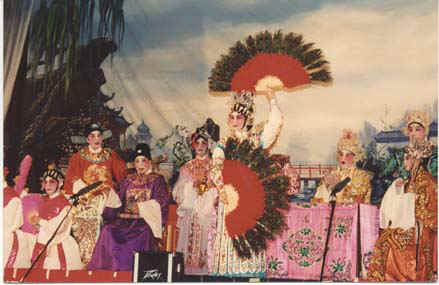
Lantern Shine: San Francisco's Nam Chung opera company presents
The Festival of the Lanterns, a scene from its production of Jade Coin
Mabel Quon
World Beat Report Santos Delgado Tanaka Vitale Goerlitz
Wong
Almeida
Gaffney
Dirctory
NAM
CHUNG MUSIC
ASSOCIATION
CELEBRATES 75th ANNIVERSARY

Lantern Shine: San Francisco's Nam Chung opera company presents
The Festival of the Lanterns, a scene from its production of Jade Coin
Mabel Quon
The Nam Chung Music Association is the oldest music and social club within San Francisco and Oakland=s Chinese-American communities. Founded in 1925, among its principal activities has been the production of Cantonese Operas, which typically have been staged for such benevolent purposes as fund-raising for charitable or social-service organizations. Within its more than 400-year tradition, Cantonese Opera turns out to be a particularly resilient art form, having been repressed to near extinction by China=s Manchu Emperor in the middle 1800s and by Mao Tse-Tung=s Red Guard in the middle 1900s. Under the auspices of the Nam Chung Music Association, the form has been given vibrant expression for several decades and the coterie of regional actors, musicians and stage crew who comprise Nam Chung=s troupe is now regarded by Bay Area audiences as the equal of any of its counterparts that periodically tour here from China.
Mabel Quon has been a member of Nam Chung for more than five decades. Initially being cast as a lead singer in numerous Cantonese Opera productions, she later emerged as a director widely sought after for her skills in cultivating and coaxing exceptional performances from the crews of actors, musicians and set designers with whom she works, as well as for the scope of her knowledge of Cantonese Opera in both its classical and contemporary expressions.
An early impression of this multi-talented individual is that, like many theatrical directors continually engaged in script selection, casting, overseeing set production, and the like, she tends not to notice the scope of her own knowledge and expertise, as if absorption in the details constantly draws her attention away from the bigger picture.
But among many stories Quon has to tell, one proved particularly illustrative. It begins with a woman in Lodi, California finding a trunk filled with costumes from Chinese opera. Recognizing only the character of the costumes, but wanting to know more, she began to make inquiries. Fortunately, there were those who could point her in the direction of Mabel Quon, who picks up the tale:
AThis woman said, >I called everybody in Chinatown. Nobody seems to know anything. So your name came up. You are the only person who can help us.= I said, >I don=t even know where Lodi is, to tell you the truth.= She said, >do you think you could come and help me?= And I said, >let me find out were Lodi is; maybe my husband can drive me there.= So my husband did drive me there, and I did meet her. She opened that trunk, and it was precious. These costumes were so old, at least over 100 years. There were no sequinsCthey were embroidered with thick silver and gold thread embedded with dime-size little mirrors. The costumes used now are mostly sewn with sequins. Sequins are German made, that=s new, that=s what they use now. So I was able to tell how old each costume is, what each costume represents, what character wears which costume. And she wrote this all down; with all the meaning of each motif. She was able to make a little book. Then she donated all these costumes to the museum in Lodi, and they were put on display for the public.@
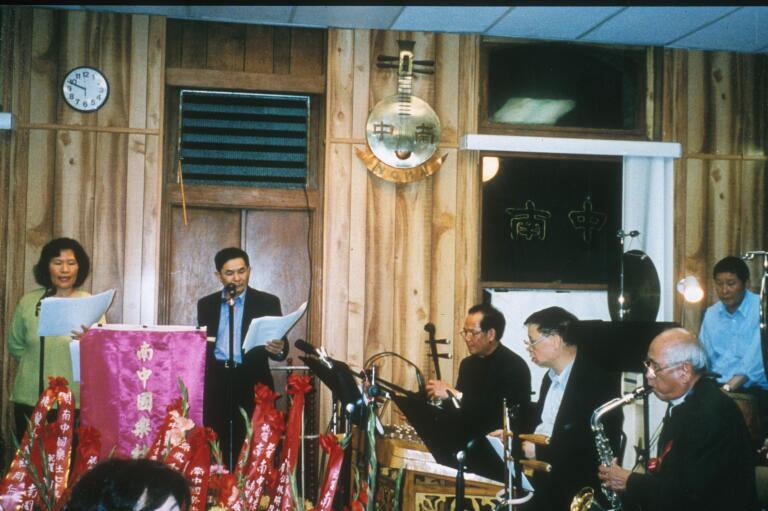
On weekend evenings, Nam Chung Music Association
provides an orchestra and performance space
for Cantonese Opera devotees
It is from the perspective of a seasoned performer and director who, simply by examining a dated set of costumes, is capable of spinning off the top of her head sufficient material for a small book, that the following glimpse of Cantonese Opera in the Bay Area unfolded. The interview was conducted in spring, 2000 to mark the occasion of Nam Chung Music Association's 75th anniversary:
WBR: How did the Nam Chung Music Association come to be
founded?
QUON: Every one knows Nam Chung. This club has been in
China-
town for 75 years; 75 years this coming July 4th. It=s
an old club, an old
respectable club. Back in 1925, it was a man=s
club. There were
several young men, maybe about less than 10 people, who Nam
Chung 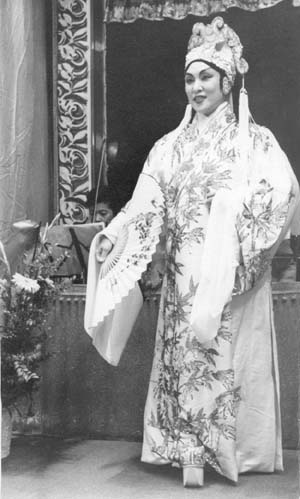
can now count as forefathers. They loved music. And they said, this is
the
only way to get together to do our own thing. Because at that time,
you have to
understand, there are no bars, no tv, no theater, no moviesC
there=s
no place to go for their own enjoyment. They all came over to
America from China
for economic reasons, or reasons of their own.
And they were very lonely. Their
wives are not here. Their mothers and
friends are not here. Where do they go? So
they formed this club, to
promote their own music.
When they played their own music, it gave them memories of when
Mabel Quon: Nam Chung's Opera
they were back home in their village, when they were a child. And
director, appearing in the
classic
they wouldn=t
be so lonely. Because music can really send you back to
Western Chamber.
_
wherever you want. Isn=t
that true? I=m sure for any ethnic
people, when
the old music is played, it reminds them of home. That=s
how this group was formed. As they go along, then more members joined in.
My father was one of the members who joined afterwards. At that time, our family had a store on Stockton street. One side was a variety store; we sold small items, toys and various items. On the other side we had a dry cleaners. I was born in a little attic in the store. My mother didn=t believe in hospitals. In those days, people didn=t like hospitals; you go to the hospital to die. That was the concept. I had a midwife, who came to our apartment to deliver. All my brothers and sisters were delivered where we lived. My father didn=t have the time to play music or sing. But he joined Nam Chung because he loved music and liked to go to the club to listen and to play mahjong. He was an amateur actor.
I didn=t join. I was recruited. Originally the club was exclusively for men. No women allowed. But during World War II, they needed women. In 1943, the members changed their constitution. They changed Nam Chung to co-ed. They recruited 10 girls. I was one of them.
Leading Lights: Grace Yung (above)
and Josephine Mah appearing in
Seven Step of Cho Gee Gin
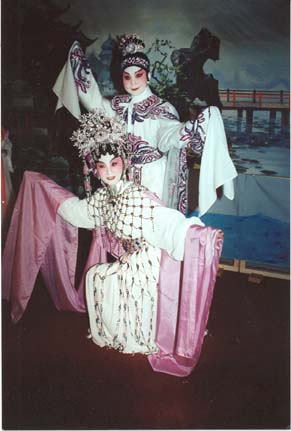
WBR: You mentioned that your father was an actor. Did he perform with a specific troupe
QUON: No. My father performed from 1906 through 1910. All the players were amateurs. This group of actors performed short plays and skits, with singing. But they were not a formalized troupe. They used fictitious names because China was still under the Manchu rule and many plays were performed to raise funds for the Revolution.
WBR: Led by Dr. Sun Yat-Sen?
QUON: Yes. Dr. Sun Yat-Sen and my father were very good friends. He came over here to the States to raise funds. And my father=s group performed Cantonese plays to get the Chinese community aroused and to raise funds. When Dr. Sun Yat-Sen went back to China, he wanted my father to go with him. My father came right out with the truth. He said look, I=m not well educated in English, and I=m not well educated in Chinese. What could I do? I=ll just be an albatross to you. I would rather not. But he was his friend.
WBR: So you came from a family with a love of theater. Do you remember your first appearance in an opera?
QUON: It was in 1945 and was titled Sai-See. Sai-See was performed to celebrate Nam Chung=s 20th anniversary. The story of Sai-See is that there were two neighboring kingdoms, the Kingdom of Wu and the Kingdom of Yu. They were always in conflict. King Fu-Cha of Wu defeated King Ow-Gin of Yu in battle and took him prisoner. A high official of the defeated kingdom, Fon-Li, went to a village and found a beautiful young maiden called Sai-See. He took her to the capitol for extensive training. He taught and tutored her in the arts of court manners, court speech, court decorum, court song and dances. After completion of this training, Sai-See was presented to the victorious King Fu-Cha, as a gift. For the next few years, Fu-Cha=s daily life was all wine, women, and song and he neglected his kingdom=s business. Meanwhile, Fon-li aroused the subjects of Yu and amassed an army and defeated King Fu-Cha in battle. King Ow-Gin was rescued from priosn and the Kingdom of Yu was restored. I played the high official, Fon-Li.
That play was very good. Later, I staged that same opera in Oakland and in Los Angeles. Prior to the 1950s, Nam Chung did a lot of charity shows, not big productions, for St. Mary=s Chinese Church, the Chamber of Commerce, and for other organizations.
WBR: Are there other music associations and clubs in Chinatown?
QUON: Oh yes, but Nam Chung was the first. There=s one on Sacramento Street called Chung Wah. And Hoy Fung is in a basement downstairs on Sacramento and Grant Avenue. There was another early one called Chick Chuck on Sacramento that=s defunct now. The Que Gee club is three buildings from Nam Chung and there=s another basement club down from Nam Chung, next to the barber shop, called Sun Won, and another one on Powell Street called Lok Yin. There are also several clubs in Oakland Chinatown. The rest are now changed into studios where they teach singing and acting. Not musical clubs.
WBR: You mention that the forefathers would play the music that gave them memories of their villages in China. Since San Francisco=s Chinatown has largely been a Cantonese community, those memories would have been of Canton.
QUON: Canton is the capitol of Kwantung provinceCa
huge province of many town, villages and hamlets. In Canton alone there are
hundreds of villages, each speaking their own local dialect and having their own
customs. But the speaking words and songs for Cantonese operas are strictly Atrue
blue Cantonese@ in poetic form.
Star Performers: Nam Chung's
Grace Yung and May Woo
appeared together in Jade Coin
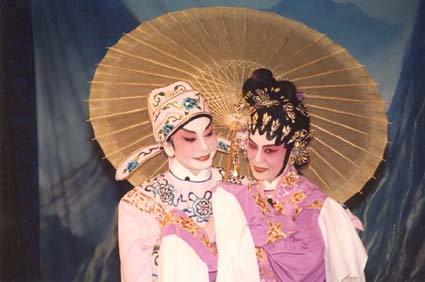
WBR: Can you share something more of the Cantonese approach to opera?
QUON: Cantonese Opera is usually classified as a regional operaCit is an older form than Peking Opera. It is believed that Cantonese Opera began sometime during the Ming Dynasty, 1573-1619. It was formed by combining several types of opera which were introduced into Kwangtung Province, such as Kun Opera from Klangsu, Chin Opera from Shensi, and Hui Opera from Anhwei. In 1723-1735, during the reign of Emperor Yung-Cheng in the area of Fatshan, which is near Canton, there was an actor named Chang Wu who began to teach the ARed Boat@ performers and who organized the actors into troupes and established an actors= guild.
Most scripts were taken from early texts, old poems and novels. In these operas, speech and singing are all in poetry. All the words may be in poems of seven stanzas, or in couplets from the Tang Dynasty, or taken from the great poetic novels of the old texts. Slowly they evolved into three sets of 18 plays each. From 1736 to 1796, the first two sets were lost. But the third set of 18 plays are still being performed.
From about 1840 to 1868, all Cantonese Opera was forbidden and all Cantonese actors were considered as Alow-life@ criminalsCworse than a murdererCbecause a very famous actor, Li Wen Mao, transported guns in the trunks for props and costumes and led an uprising against the Manchu Emporer. He is still a legendary figure. When the Opera revived in 1868, there were no scripts, no props, no nothing. The 18 plays were preserved in the memory of the performers. Most actors were illiterate, but they knew their craft well. Without playwrights or scripts, the actors utilized and improvised on pre-arranged synopsis involving a group of familiar, formalized set of acts, set of song tunes, set percussion music, established gestures, pantomime and movements. All these must be studied by rote memorization.
All Cantonese Opera is based on pre-arranged, set drumming and percussion. There=s always percussion and beats when you enter, when you leave, when you sing, when you change moods. The drummer is very important. He is the one who steers the musicians, like the captain of a ship. There are all kinds of opera in Kwangtung! There was a Chicho opera I saw that I can=t understand a word. But the music was beautiful. There is a saying, AChicho=s music is beautiful.@ They have the same costuming as Cantonese Opera. The same make-up. The same gestures, same staging. The music is very pleasant, very soft. It has something to do with the intertwining with the Balinese music. I saw a Chicho play in Hong Kong and to me it sounded like Balinese music.
With Peking Opera, the costumes are also the same. The Peking Opera sticks to certain plays and keeps at them constantly, year in and year out. Like the show, My Concubine. They get to the point that they do it so much, they=re expert at it.
Cantonese Opera has its 18 great traditional operas. If you=re a good actor, you should know your specialized role within all these 18 plays by heart. After harvest time, or for any special festival day, there=s going to be a whole week celebration. From the 18 traditional operas, the village elders say, Achoose this one for Monday night, and choose this one for Tuesday night; choose this one for Wednesday night.@ Let us say, this village is contemplating a whole week of celebration to honor the birthday of Kwan Yin, the Goddess of Mercy. Prior to this celebration, the village elders will go to the big city, Canton, to the actors= guild to choose which troupe they want. All these troupes are congregated in big junksCpainted red. These junks are called ARed Boats@ and they served as living quarters for some players. The village elders then will sit down to negotiate with the agents for which troupe and which plays. Each troupe has its own repertoire of old plays.
WBR: Are there are any settings in Chinatown where these plays can be staged?
QUON: Yes, there used to be two, in my time. One on Grant Avenue is a mall now. The other is still on Jackson Street, the Great Star. The Great Star now is doing movies. Maybe once in a blue moon there=s a troupe from Hong Kong or a troupe from Canton. Then they use the Great Star Theater. Outside Chinatown, there used to be the Pagoda Theater at Union and Columbus. That was the best theater, because it sat over a thousand people, whereas the Great Star only holds about 700.
WBR: What instruments are typically used for Cantonese Opera?
QUON: Prior to year 1930, these are the traditional instruments used for Cantonese Opera: a small pitched drum, a large double-faced drum, a wooden clapper or block, two large gongs, two large cymbals, a flute called Adeg,@ which is shaped like a conch shell; a flute shaped like a large cigar, the yee-yin, the chief instrument; and the sam-yin, the tie cum and yat cum, all string instruments.
By 1920 to 1930, the butterfly harp called the yang-qin, the 2-string erhu, the chun-gin, which is like a banjo, were used, and other foreign instruments like the violin, saxophone, trumpet, clarinet, guitar. During this time, from about 1925 through 1930, more theaters were built in Canton and operas also began to be modified with new ideas, new playwrights, and new popular tunes.
WBR: Did you know any of the original founders?
QUON: Oh yes. In fact, one of them was my master, NamedYung Shek. He taught me how to sing. He was excellent. He was the best in San Francisco Chinatown, with his particular instrument, the yee-yin, the chief fiddle instrument. Nobody plays it any more. This particular instrument is played in battle scenes, and as accompaniment for singing older operas. But when he taught me how to sing, he didn=t use this instrument. He more or less lectured, showing me how to breath properly, how to accentuate certain words, how to sing emotionally, and the art of opera singing.
WBR: How many members does Nam Chung have now?
QUON: Over a hundred. Most of the new members are now women who love to sing excerpts from Cantonese Opera. All they want to do is just sing.
WBR: And how often do people have the opportunity to get up and sing?
QUON: Every week, Friday and Saturday nights. There are so many new singers, they have to take numbers to wait their turn. When they learn from these masters, they want every opportunity they can to sing. You go to another organization, you have to pay an enormous price before they let you sing. Because the musicians want the money. It=s like an addiction. Once you start to learn, you want to keep going. And when you=re addicted, you need somebody to play for you so you can singCso you pay!
Sibling
Rivalry: Grace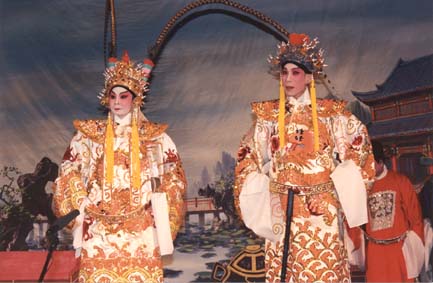
Yung and Tony Lok ,
appear as rival
brothers in Seven
Steps of Cho Gee Gin
WBR: On my one visit to Nam Chung, I noticed that the singers presented the orchestra with notated scores. Where are the scores available from?
QUON: Hong Kong and Canton, because the operas are still being performed. Most of these songs are from popular plays and recordings. A lot of times these songs are done on tapes, so that people could buy the tapes of the whole play to listen to. But that=s very bad. If you take these tapes to do an opera production, it=s confusingly wrong. These tapes minimize the drumming. Every time a person enters or leaves the stage, there is drumming and the person must walk according to the beat. The music companies want people to listen only. Therefore, by cutting out the beats and drumming, it is more lucrative for them money-wise.
That=s where I come in as director. When I review a script from tapes, I scrutinize all details. When did this person enter?@ The script should tell who=s entering or leaving. You can not just all of a sudden start singing. When did he appear? He=s not a fly; he doesn=t just come in like that! I=m the one who scrutinizes the whole script, by looking at it and say, hey! what happened here? Why? I=m always asking questions. You cannot just flip-flop over to a situation. For each motion, there=s a set beat. Every time there=s a word that is accentuatedCAI hate you@ or AI love you@Cthere is a certain set beat, certain set drumming. Everything is emphasized. It=s pantomime, like Marcel Marceau. Pantomime, but with an accent. That=s Cantonese Opera. You have to understand that in the old days there are no microphones. So if you=re playing in a festival in a village, mostly outdoors, you have to sing loud and clear and your motion is emphasized so that from way back, the audience will understand all your gestures. Everything is done precisely.
WBR: When did you start to direct?
QUON: 1990. That was Nam Chung=s third big production since 1962. Between 1963 and 1973 we did a lot of small productions. We were approached by the ANewcomers@ of Chinatown. This organization=s main goal is to help the immigrants. Show them how to fill out applications for jobs. Show them the U.S. law, how to get their social security, their housing, tell them what to do when in trouble. This group approached us, saying they need funds to continue their work. It so happened that one of their members is also a member of Nam Chung. So we had a meeting. We wanted to do it, because we want to do something good for the community. We can=t just sit around and just sing and talk and gossip. And play mahjong. This is a waste of time. We want to utilize our time, to do something worthwhile.
Being the director is not easy. First you take it upon yourself to get all the players together and then choose a play, a famous play, whereby every one is satisfied. Nam Chung is very fortunate to have two performers who are professionals from Hong Kong One married and came over to the States as a bride. Later she became a member of Nam Chung. Her professional name is AYim Hoy Tong.@ She plays the boy=s part and she=s a well-known professional. For the girl=s part, we were fortunate also to have this girl from Hong Kong, Josephine Mah, who graduated from England and who loves Cantonese opera. She studied under a famous actor in Hong Kong. She also is a member of our club. I was fortunate to have at least these two, the two needed stars.
I sat down with our top musician, Emma Chan. She is another of the first 10 girls recruited by Nam Chung. She said, AI know we could swing it if we could get these two stars together.@ Let=s approach them and see what happens.
So I approached Yim Hoy Tong, who plays the boy=s part. She said, ALook, I haven=t done this for 13 years, since I got married. I haven=t been on stage for 13 years. Of course, I could still sing. But I have to be trained all over again.@
I said, ALook, we have many months. You can do it! Just like driving. Once you know how to drive, and if something happens, you could start over again, it comes back to you.@ She was very nice. She was willing. The other actress has always loved to perform and is always performing. She was willing too!
So we choose a play that is very well known, Princess Flower, which is a story of the fall of the Ming Dynasty in 1643 A.D. It=s still being performed all over in Hong Kong, in Malaysia, Singapore and in Vietnam. This is a famous play.
OK, the two leads, I=m not worried, because they=re professionals. But what about all the others that follow? Number two actor? Number three actor? Number two actress? Number three actress?
You have to understand: we don=t all live in Chinatown. Most members live all over the Bay Area. In order to make it work, I said, we have to put in a lot of work. By work, I mean, number one, a lot of study. Number two: long rehearsals. So I ask them to come back to Nam Chung to do rehearsals: every Friday and every Saturday night. Sometimes the players have other commitments and I have to try for a full cast at least once a week. That=s only four days in a month. We=ve got to start early, at least give us two to three months. This particular play has palace scenes, temple scenes, throne scenes, garden scenes. Imagine the court ladies, the maids, the attendants, the guards. These people have to be trained. And it isn=t easy, because they=re not professionals. Some of them have never even attempted to do a play on a stage. They don=t even know how to walk.
WBR: How to walk entering or leaving the stage?
QUON: It=s not just walking on stage. You walk with the beat! Cantonese Opera has set beats. You have to walk a certain way, according to the beat. Not the regular way we walk. It=s not a dance; certain characters have a certain decorum, a way of conducting themselves. Certain footsteps to be a maid. Certain footsteps to be a guard, or an attendant. Certain footsteps to be a magistrate or the king.
We did the best we could, and it was a success. It was so good that the On Lok peopleCself-help for the elderlyCapproach us and say, AOh my gosh you have to do this play for us.@ We said, Awe just did it.@ They said, Awe don=t care. We need to have a fund-raiser for our organization. We need your group, to help us.@ I said, AWell, if you don=t mind we could do the same play in another couple of months . . . .@ So we did it. We put the same play for On Lok. And it was very successful. For the next 3 years, 1990 through 1992, each year we put on playsCall big productions for the On Lok organization and 1993 through 1995 for Chinatown Resource Center.
WBR: During your 50 years with Nam Chung, are there any particularly special moments that stand out?
QUON: Yes. After presenting Princess Flowers here, we were approached by Red China to come to Canton for their first Cantonese Opera convention in December, 1990. We were really enthused and delighted. So we took this same play to Canton to perform for one night. We had to pay our own plane fare, but they took care of our lodging and food. The audience was so surprised. They think we couldn=t even speak Chinese, let alone give plays. They were really shocked. And the proceeds from ticket sales were all donated to their art culture center in Canton.
You have to remember, a large group is needed for this play. Not every one from Nam Chung could go to China, because of work, because of family, because of commitments. Maybe half of the group went. So, we got performers in Canton to help us for whoever was needed.
We were able to do that one night in Canton. That convention was seven days. There are so many theaters in Canton and they were all doing plays, simultaneously. There were plays in the north, in the south, in the east, in the west. They even had an outdoor play, just to promote this Cantonese Opera convention. It was up to the public, who wants to buy tickets to go to whichever play they want to see. It was a great success.
WBR: Any other magic moments?
QUON: I remember one year when I played the leadCthe boy=s partCwith two professionals from Hong Kong, for a fund-raiser for the Chinese hospital. The play was the Western Chamber. You know why I chose the Western Chamber? Because it has the least characters. All the opera has is the boy, the girl, the mother, the maid, the girl=s little brother, and a couple of monks. Eight people only.
It=s about this girl, beautiful, of course, who is the daughter of the prime minister. One day, she and her mother and all the maids went to the temple to give thanks to the Goddess. Then there is a boy, his name is Chung Sung. He happened to worship at the temple at the same time. He saw the girl and he fell in love with her. He can=t meet this girl!; impossible!. During that time there were a lot of bandits, who found out that this minister=s wife and her family is at this particular temple. Let=s kidnap them for ransom. As the story progresses, the bandits are defeated and, due to the conniving of the most important maid, Hung Neun, the young lovers are united.
WBR: Did Nam Chung ever use performers from other clubs for its operas?
QUON: Not really. If we could do it ourselves, we do it ourselves. Sometimes if a person does not belong to any other club, maybe we would recruit that person.
WBR: Where are the plays physically staged?
QUON: Now, in Yerba Buena, near the Moscone Center, or at the Great Star Theater on Jackson Street.
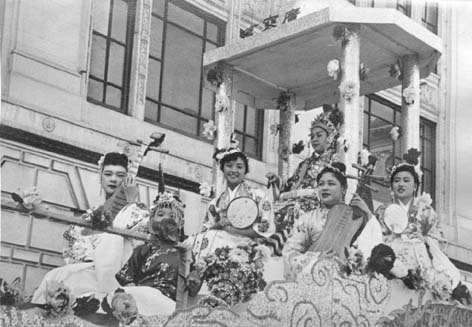
Photos courtesy Mabel Quon
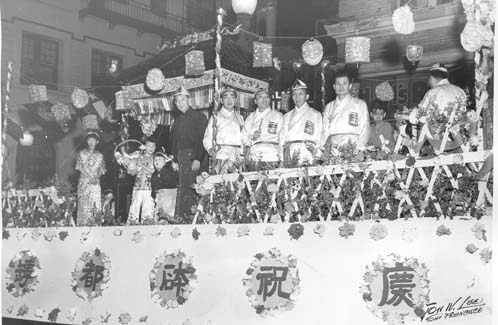 VICTORY CELEBRATION
VICTORY CELEBRATION
World War II drew to a close and Nam Chung Music
Association represented San Francisco
Chinatown in City-wide festivities celebrating the arrival of peace throughout
the Pacific.
WBR: Was there ever a local Cantonese Opera association that worked with more than one club in Chinatown?
QUON: Only during World War II. We did a lot of things together then. Eight musical clubs got together and put on big productions. It was all fund raising for the war effort. We all had brothers, husbands and fathers in the service. Because of that, fund raising was a common thing, we all felt it should be done. At that time there were eight of us. They called us the AEight Great Musical Clubs.@
WBR: Do you direct outside San Francisco?
QUON: Yes, I direct and also play the leading part. A benevolent organization in Los Angeles asks me to help, I go there. I flew to L.A. and rehearsed with the cast for one night. Then we give the play on Saturday and Sunday. But Friday night is hell-bells, >cause I get there by plane and rehearse immediately. No time to eat. No time to sleep. I did this for many years.
WBR: Did your training for Cantonese Opera occur in San Francisco only?
QUON: No. In 1958 I went to Hong Kong for more study, although I was doing a lot of plays already. I was in Hong Kong for three months and studied under a Shanghai master, Kwok Hung Bun. Not for singing; I already knew how to sing. Not for acting; I already knew how to act. What he taught me are these set movements, certain Kung Fu movements and positions. I needed this training because I was playing a boy=s part. He was very good.
At that time, I can=t go to China, only to Hong Kong. 1972 was the first time I went to Canton. That was after the normalization of President Nixon with China. After that I kept going back because my husband had brothers there. My brother-in-law, my husband=s younger brother, was the governor of Xinjiang. He did the Long March. When he was 16 years old, he was in the village going to school. He wrote to my husband, here in the States. He said, AI would like to follow Mao.@ But, of course, the family won=t let him. AWhat should I do?@ My husband wrote back to him and said, AYou follow your heart. It=s not what the family wants or what Mao wants. You follow what you think is right.@ So he did. He followed the March. A lot of suffering; a lot of suffering. And after Mao became the premier, there was a lot of purgingCall politics!, especially during the Cultural Revolution. After Mao=s death, my brother-in-law became governor of Xinjiang.
I=m going to tell you an amazing story. The first time he wrote to meCthat was more than 15 years agoChe asked me to send him some tapes. Tapes of what? He wants tapes of Mozart, Beethoven, all the great classical works. How in the world does he know about this music? He evidently was sent to Russia when he was young, to study communism, and therefore was exposed to all this music. When I went back with my husband the first time to meet him, he had retired and requested to return to Canton, instead of staying up in Beijing. And I went and got him all kinds of classical tapes. He was so excited, so elated. I swear, he just loved that music. Isn=t that something?
WBR: Over the years, were there some people locally who distinguished themselves as very good musicians?
QUON: There are a lot of good musicians in the Bay Area. Some of these people are self-taught; some are already established musicians from Hong Kong and Canton. Very good. Now this girl in Nam Chung, Emma, was born here and is one of the best musicians in San Francisco. She is Nam Chung=s Afirst position@ musician for Cantonese Operas.
WBR: What does she play?
QUON: Violin and jong wu, which is a bowed instrument like the two-string erhu, but with a bass sound. She studied violin when she was in school and converted it into Cantonese Opera. She kept telling me, AI can=t read these Chinese notes.@ But she has a good musical ear. Anything that you play or hum, she can just immediately pick-up.
WBR: Local enthusiasts for European Opera now and then mention that the great tenor Enrico Caruso appeared in San Francisco. Have there been any comparable figuresCthe Carusos of Cantonese OperaCwho performed here?
QUON: There were many. I could only name a few, like Chan Sil Fong, Ho Fei Fon, and Lum Gar Sing. All of these are great actors and recording stars, well known in Hong Kong, Canton, Singapore and Malaysia.
WBR: Are there people who specialize in make-up for Cantonese Opera?
QUON: Each player has to learn to do his or her own special make-up. It is called Sau Bo, Ahand precious.@ Nobody could do it for you because you know your own features. You must know which feature you want to accentuate for certain parts, especially if the part requires a painted face. You alone know which part of your face you want to emphasize. A make-up artist can=t do that for you. Before you become an actor, you have to learn your specialized character part. Then study your own features. Then make-up.
WBR: And the costumes?
QUON: The costumes are made by people in Hong Kong, Canton, and Shanghai, who specialize in costumes.
WBR: Do the actors and actresses keep their costumes as personal property?
QUON: No, if you belong to a troupe. But if you don=t belong to a troupe, you could spend hundreds of dollars, just for one costume alone. Like Josephine, our lead actress who did Nam Chung=s show for Chinatown Resource Center, spent $6000 dollars U.S. for a costume, but that includes the headdress and ornaments. That=s a lot of money. But in my time, I didn=t spend that much. I had a lot of costumes. The most I spent was $500 each. But nowadays it=s going out of whack. Just like everything else, I guess.
WBR: Are there individuals who specialize in creating the sets for Nam Chung Cantonese Opera productions?
QUON: Oh yes. Nam Chung has an electrician, Hank Wong, a very important person. Nam Chung also has Raymond Chan, who does all the props for us. He=s very good. It=s a big task because he often takes on something that is almost impossible to do. But I said, let us try anyway. He always comes through. And he does everything really wellCvery creative!
WBR: You mentioned a couple of plays such as Princess Flower and The Western Chamber. Elsewhere, mention is made of such plays as Dream of the Red Chamber, The Purple Hairpin, The Rejuvenation of Red Plum Flower.
QUON: These plays are not in the traditional 18 group. These plays all came about later, modified from old story lines. They are more like contemporary plays.
WBR: So Cantonese Opera continues to be a contemporary art form, even if it=s centuries old?
QUON: They=re writing new material because at one time, because of the Red Guard, all costumes, stage props, scripts, were destroyedCno operas. Anything to do with education, anything to do with kings, or the old classic stories were burned. Afterwards, it appeared again, the opera lives on! That=s when all the new writers came out. There are so many now: the contemporaries are just hundreds. They have new ideas. Some of them are very good.
WBR: So the Red Guard didn=t like traditional culture?
QUON: NothingCno school, no teachers, no books, no art, no plays and nothing foreign. If you had a violin in your home, it was chopped up. They take you to jail. It was called the Cultural Revolution. Because of the Cultural Revolution, China lost a whole generation!
WBR: What was the last opera you directed?
QUON: It was in 1995. But my favorite opera was in 1994, The Seven Steps of Cho Gee Gin. This is a classic historical play. It=s set in the Sung Dynasty and is about two princes who are brothers. The eldest, Cho Pei, is a warrior, macho, macho. The second, the younger brother, Cho Gee Gin, is very scholarly, very well liked. He=s known for his poetry and couplets. He=s very handsome and the favorite son of the king and queen. Both brothers love one girl. This girl is actually a captive from another nation, and had been taken back as a child to this kingdom. There her schooling started and she played and studied together with the two princes and grew up with them.
She and the younger prince fell in love with each other. But the older prince loved her too. Being the favorite son, Gee Gin was decreed to be king someday and therefore cannot take Yuen Jing as a bride, because being a captive, she can never be a queen. The king then decrees that this girl marry the older son instead.
The younger son was devastated. But there was nothing he could do. So during the night of the betrothal, Gee Gin slipped a note to Yuen Jing saying, let=s meet and talk. The note designates a remote place to meet and just talk. But this older brother knew something was wrong, went there and said, Hey! you can=t do this, she is my wife. The old king was furious, thinking of infidelity between the two. He banished Gee Gin to a remote, far away province never to return to the palace. Several years later, the old king died and Cho Pei was crowned king.
Cho Pei was still envious of Cho Gee Gin, he just can=t rest: some day he=ll return and take my throne and wife. If there is a way to get him back to the palace, I=ll kill him. It will be the end of my worry. Cho Pei began to pressure the old mother: I=m sure you miss your favorite son, why don=t we get him back to see you? The mother says, Awhy don=t you write to him to come back to see me?@ Cho Pei says, Ano, he will never come back unless my wife writes the letter; then he will come back.@ So they both pressured the wife to write a letter to Gee Gin.
Yuen Jing is very intelligent and well versed in writing. But she=s smart. She wrote the letter. She used no punctuationCno periods, no commas, no semi-colons. Just straight: your mother wants to see you, come home, she misses you. When the Gee Gin read the letter, he understood: in other words, you=ll be killed if you return. But he still said, AI have to go back, I have to see my love again.@ He went back.
There is a throne scene in the garden, a lot of magistrates, a lot of guards, and court people. The King, Cho Pei, speaks to his younger brother, Gee Gin: this whole nation says that you=re very literate and a great scholar. To prove yourself, I want you to do something for me. I=m sure you can do it. In seven steps. You have to compose a poem. I will use one word. From that one word, you will compose this. If you do it well, fine. Not, I=m sorry, your head will come off.
So he used the word Abean.@ And Gee Gin did it, in three steps, in less than five seconds. It was a great, meaningful poem, saying that from this bean, there are other beans from the same pod, something to do with brotherly love. He proved he is indeed a great scholar. The whole court was amazed, surprised, impressed and praised Gee Gin. Cho Pei has no recourse but to let Cho Gee Gin go.
The wife, Yuen Jing, knew her husband=s envy was not going to go away. So she appeared before her husband saying, in our garden there is a three-legged incense burner, five foot tall. Hand me your sword. So he gave it to her. She took the sword chopped one of the legs off. Of course it toppled. He said, Awhy are you doing that?@ She said, this is to show you that to be a great king you must not let anything happen to your brother. If you kill your brother, your nation will fall, like this incense burner. You need other good people, too. No one person can stand alone. You will be toppled if you don=t listen to my plea. And Cho Pei realized that he was wrong and repented.
After this conversation, she jumped into a stream that ran through the garden and died. Her body disappeared. So, like in any fairy tale, she became a water sprite. That=s when the $6000 costume appears on stage, in the final scene. Josephine appeared as the water maiden in her fabulous costume.
In this opera, every player was so good and the music was excellent. We got more compliments from the audience: they said, we don=t need troupes from Hong Kong and Canton: you people do it better!
After each successful production, I am always overwhelmed with pride and gratitudeCnot because of the success of the play, but pride for the Aunsung heroes,@ the backstage workers. They work like beavers as scenery changers, costume handlers, make-up helpers, curtain pullers, photographers, video, clean-up and movers. These people are all members of Nam Chung. They work with great dedication in unison as a team like a big family toward one goal: AFor the glory of Nam Chung!!@